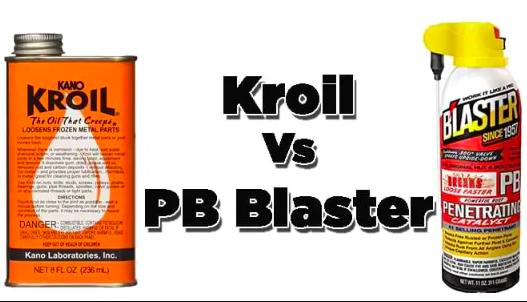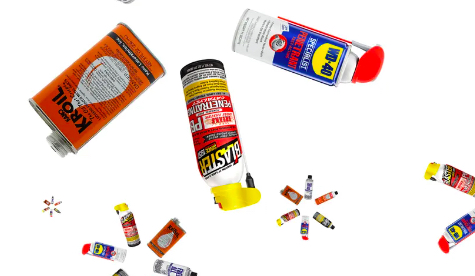At some stage, every vehicle owner is frustrated with dealing with rusted and jammed components like log nuts and bolts on their car. Over time, these metal parts and fasteners become rigid and corroded, making tasks such as changing a tire or performing simple mechanical adjustments exceedingly challenging. The unanimous solution to these pervasive issues is the application of penetrating oil. But the question arises: which one to choose?
A trio of contenders stands in the heart of the ongoing market debate: “Kroil vs. PB Blaster vs. WD-40“. This article delves into a comprehensive comparison of these three popular penetrating oils, evaluating them in various aspects.
A Comparative Overview: Kroil, PB Blaster, and WD-40

A comparison chart has been formulated to simplify the distinctions among Kroil, PB Blaster, and WD-40, outlining their respective features and efficacies in various functions.
- Efficacy Against Rust: When combating rust, PB Blaster outshines the others with its robust effectiveness, while Kroil shows decent results, and WD-40 lags slightly in this area.
- Rust Prevention: PB Blaster leads in preventing rust recurrence, while Kroil shows lesser effectiveness, and WD-40 falls in between.
- Corrosion Mitigation: Kroil and PB Blaster are proficient in reducing corrosion, but WD-40 does not exhibit significant results here.
- Applicability: Kroil and PB Blaster are versatile and suitable for various metal parts, whereas WD-40 is more selective and less ideal for nuts and bolts.
- Lubricity: WD-40 excels in retaining moisture and preventing dryness, while Kroil evaporates more swiftly, and PB Blaster dries quickly post-application.
- Cleaning Capability: All three oils can be used as cleaners, but WD-40 is especially commendable.
- Price Point: WD-40 emerges as the most budget-friendly, followed by PB Blaster, with Kroil being the most expensive.
In-Depth Analysis: Kroil vs. PB Blaster vs. WD-40
A closer examination of these oils reveals their strengths and limitations across seven key factors.
- Handling Rust: Kroil’s effectiveness against rust is moderate, whereas PB Blaster shows impressive results in rust removal. WD-40 is ideal for mild rust, especially on classic cars.
- Preventing Rust Return: Kroil’s lower efficacy in rust removal questions its ability to prevent rust from returning. PB Blaster, excelling in heavy rust cleaning, assures more effective rust prevention. WD-40 falls in between.
- Corrosion Reduction: Kroil and PB Blaster effectively mitigate corrosion, whereas WD-40’s performance is subpar.
- Usage Suitability: Kroil and PB Blaster are versatile for various metal parts, but WD-40’s suitability is more limited.
- Moisture Retention (Lubricity): Kroil and PB Blaster lack in providing sustained moisture, whereas WD-40 excels in this area.
- Cleaning Properties: All three oils can be used for cleaning, but WD-40 stands out as the best option.
Choosing the Right Penetrating Oil: Kroil, PB Blaster, or WD-40?
The choice of penetrating oil depends on the specific needs and purposes of the user, as each oil has its unique chemical composition and specialization. Kroil may be preferred for a broader range of applications, PB Blaster is recommended for handling severe rust, and WD-40 is ideal for situations requiring high water displacement.
Frequently Asked Questions
- Kroil vs. PB Blaster: PB Blaster, being more cost-effective, generally outperforms Kroil, especially considering Kroil’s sometimes inconsistent results in real-world applications.
- PB Blaster vs. WD-40: Direct comparison is challenging as PB Blaster specializes in rust removal, while WD-40 excels in moisture control.
- Avoiding WD-40: WD-40 should not be used on electrical devices or household equipment due to its specific properties.
- Top Penetrating Oil: The market offers various top-tier oils, including Kroil, PB Blaster, WD-40, and Liquid Wrench, each with unique strengths.
Concluding Thoughts
The effectiveness of any penetrating oil largely depends on the rust’s severity or the components’ tightness. Patience and multiple applications can significantly enhance the results. A pro tip for improved efficacy is to preheat the parts before applying the oil, boosting its penetrating capabilities.
